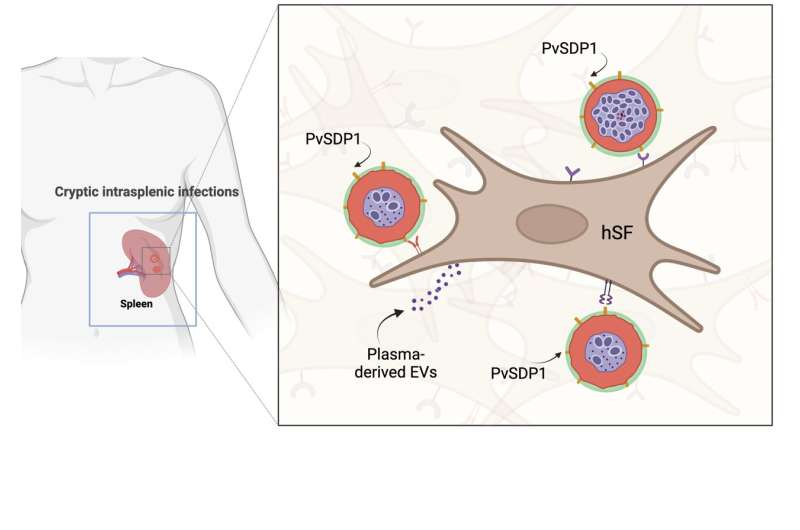This article has been reviewed according to Science X's editorial process and policies. Editors have highlighted the following attributes while ensuring the content's credibility:
fact-checked
proofread
Scientists show the key role of spleen and extracellular vesicles in cryptic malaria infections

Recent research led by Carmen Fernández-Becerra and Hernando A del Portillo from ISGlobal and Germans Trias i Pujol Research Institute (IGTP) has provided new insights into the role of the spleen in malaria, specifically in infections caused by Plasmodium vivax.
Malaria caused by P. vivax is widespread globally, with nearly 77 million cases in 2022. While there is no sustained local transmission in Catalonia or most of Europe, in endemic regions such as Southeast Asia and Latin America, it is estimated that over 2 billion people are at risk of transmission.
P. vivax infection is transmitted through mosquito bites. Once infected, a person may develop an acute infection—with symptoms including fever, chills, sweats, and muscle pain—or the parasite may remain in a latent state. This poses a significant challenge for diagnosis and global eradication of the disease, as up to 90% of chronic infections are asymptomatic and many are undetected by current diagnostic methods.
To address this issue, scientists from the Plasmodium vivax and Exosome Research (PvREX) group at ISGlobal and IGTP have been studying how the parasite manages to hide and evade immune responses and conventional treatments. They focus on the spleen, which recent studies suggest houses over 95% of the parasite's biomass.
Previous research has shown that the spleen not only filters out old and defective red blood cells but also serves as a hiding place for malaria-infected red blood cells. Additionally, they have demonstrated that extracellular vesicles—small structures secreted by infected cells—facilitate this hiding process. These vesicles promote the adherence of infected cells to spleen cells, a crucial mechanism for the parasite's survival.
In collaboration with researchers from the Josep Carreras Leukaemia Research Institute, the Institut Pasteur du Cambodge, and the Microbiological and Biomedical Research Group at Universidad de Córdoba, the PvREX team led by Fernández-Becerra and del Portillo has published a study in the journal Frontiers in Cellular and Infection Microbiology that provides new details on the cellular processes occurring in a P. vivax infection.
Using advanced genetic techniques, the researchers have shown that a P. vivax gene, whose expression depends on the spleen, is associated with the parasite's adherence to spleen cells. This adherence is enhanced in the presence of extracellular vesicles derived from the plasma of infected patients.
By analyzing individual cells, they have also demonstrated for the first time that extracellular vesicles send signals to spleen cells to express proteins that facilitate the parasite's adherence. "These results open new avenues for identifying signaling pathways induced by extracellular vesicles in human spleen cells, a critical step in halting the transmission of the parasite," says del Portillo.
Asymptomatic chronic infections pose a significant challenge for malaria eradication. This study provides valuable information on how malaria parasites hide in the human spleen, highlighting the importance of understanding the interactions between the parasite and its host. "Identifying these interactions is essential to combating this global health challenge," states Fernández-Becerra.
More information: Alberto Ayllon-Hermida et al, Plasmodium vivax spleen-dependent protein 1 and its role in extracellular vesicles-mediated intrasplenic infections, Frontiers in Cellular and Infection Microbiology (2024). DOI: 10.3389/fcimb.2024.1408451
Provided by Germans Trias i Pujol Research Institute





















